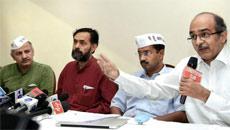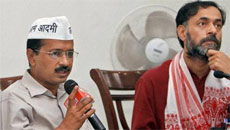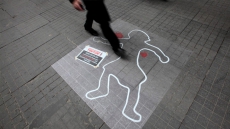Former prime minister Atal Bihari Vajpayee was on Friday conferred with the Bharat Ratna, India's highest civilian honour, by President Pranab Mukherjee in a brief ceremony at his home here attended by the country's leadership.
The president, in a break from protocol, arrived at Vajpayee's 6, Krishna Menon Marg residence here to confer the top honour on the nonagenarian Bharatiya Janata Party leader who has been keeping poor health.
The ceremony was attended by Vice President Hamid Ansari and Prime Minister Narendra Modi as well as former prime minister Manmohan Singh and senior BJP leader L.K. Advani, among others.
Prime Minister Modi, addressing the media outside, expressed his gratitude to President Mukherjee for coming to Vajpayee's home to personally hand over the award.
He said Vajpayee's life was "dedicated to the nation... He lived for the country... His every moment was for the country. There are crores of karyakartas (BJP workers) like me, for whom Vajpayee-ji has been an inspiration and will remain so. His life will continue to inspire and guide future generations".
Finance Minister Arun Jaitley later announced the conferment of the award to the media throng, which was not allowed to enter the house or cover the actual conferment ceremony.
A photograph of the president placing the medallion around a seated Vajpayee's neck was released later.
Vajpayee, 90, was the first non-Congress leader to serve India for a full five-year term (1999-2004). His earlier two stints in office lasted 13 days and 13 months, respectively.
Always seen as a moderate in a party where many other leaders espoused Hindutva ideology, Vajpayee had stunned the world by making India a declared nuclear state in 1998. His popularity came to match that of Indira Gandhi and he became the country's best known national leader after Gandhi and her father Jawaharlal Nehru -- until Modi stole the show in 2014.
The bachelor politician first entered parliament in 1962 through the Rajya Sabha. It was only in 1971 that he won a Lok Sabha battle. He was elected to the Lok Sabha seven times in all -- and to the Rajya Sabha twice.

Vajpayee proved to be an astute politician, at times seen as a statesman. He combined the compulsions of politics with his BJP's rightwing ideology but would seldom budge from the USP of his high ethical pedestal.
When he stepped down in May 2004 after an election that he was given to believe he would win, it marked the end of a long and eventful political career. Almost since then, Vajpayee has suffered from frail health.
The Modi government announced the Bharat Ratna to Vajpayee on December 24 last year, a day before his 90th birthday, and to educationist Madan Mohan Malviya (posthumous).
Among the other guests present at the ceremony were senior union ministers and several chief ministers -- including Jammu and Kashmir's Mufti Mohammad Sayeed, Madhya Pradesh's Shivraj Singh Chouhan, Rajasthan's Vasundhara Raje, Andhra Pradesh's N. Chandrababu Naidu, besides Rashtriya Swayamsevak Sangh (RSS) chief Mohan Bhagwat and Janata Dal-United leader Sharad Yadav. Former president A.P.J. Abdul Kalam was also present.
Various leaders welcomed the conferment of the honour.
West Bengal Chief Minister Mamata Banerjee tweeted: "Happy that Atal Ji is being conferred Bharat Ratna today. A truly great statesman who richly deserves honour. I wish him well...."
Former Jammu and Kashmir chief minister Omar Abdullah tweeted: "My heartfelt congratulations to Vajpayee Sahib & his family on the day he receives the Bharat Ratna. It was an honour to serve under him."
In a press release, Rashtrapati Bhavan said President Mukherjee conferred the Bharat Ratna upon Vajpayee. "In a special gesture, the President conferred the Award in a simple ceremony held at the residence of Vajpayee."





